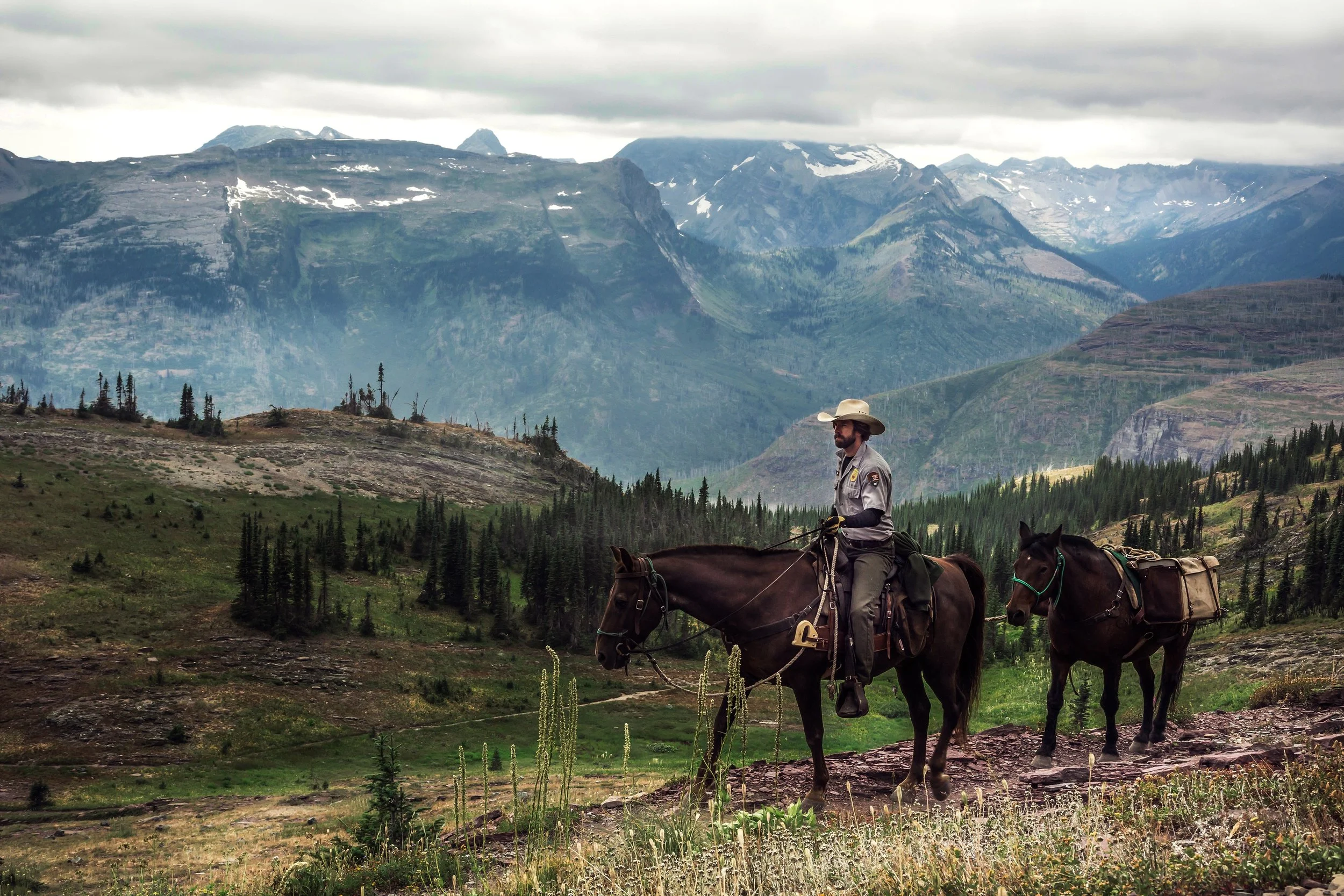Mountain Ranger to Musician
Story by Helen Widman
OU grad’s inspiring journey shines through in his debut album, He Rode On.
Shaw poses for a photo with his cowboy hat.
Photo by Greg Kuchik.
The early spring morning curled over Radar Hill as a then 22-year-old Michael Shaw scoped out a spot to decide his future. After studying all night for final exams at Ohio University, he found himself near The Ridges watching the sunrise. After graduating with degrees in psychology, philosophy and music, Shaw felt encouraged to strive for a life free of distractions and focused on art.
“I knew I wanted to go out west, and I just remember being out there and the sun was coming up, and I was like maybe I should go out to Montana,” Shaw says. “It was kind of random. I didn't really know anybody out in Montana; I didn’t have a job.”
Shaw grew up in states bordering Ohio until he landed in Springfield, hailing from a musical family. Shaw attended OU and quickly hit it off with Colin McKnight, who ended up becoming a longtime friend and music partner.
After graduating in 2002, Shaw took the chance and moved out to Montana by himself.
“I found a guy who was like, ‘You can give me 100 bucks and live in my barn in the back of my house till you find a place,’” Shaw says. “And in my 22-year-old brain, I was like, yeah that sounds great.”
Shaw explores the Montana wilderness on a hike.
Photo by Chris Sawicki
Shaw worked as a tele-researcher for a couple months then with troubled teenagers. In 2005, he stumbled upon what would become a lucrative job and outlet: becoming a seasonal ranger at Glacier National Park.
“I think it was challenging but in a way that never felt stressful because I gravitated to it so naturally, like I’d already been hiking in the mountains by myself and [was] learning how to get around in the Northern Rockies.” Shaw says.
Shaw spent the warmer half of the year as a park ranger, soaking in the wilderness around him. During the winters he stayed inside with his favorite literature and started playing around with music. McKnight joined Shaw in the mountains eventually, and the two formed a country band called Whiskey Rebellion, with Shaw on his drums and McKnight on his electric guitar.
Brandon “Rex” Stewart, a programmer and artist from southern Utah, connected with Whiskey Rebellion in winter 2010. Stewart grew up playing the guitar, but not bass — and not country music. Still up for the adventure, he joined Whiskey Rebellion and found brotherhood within Shaw and McKnight.
“We would pass out whiskey shots to the crowd at a certain point, I think it was on our fourth set,” Stewart says. “So that was basically just a tradition. We’d get the crowd a little more wasted than they already were.”
Whiskey Rebellion began to fizzle as the then-lead singer departed from the group. Shaw, McKnight and Stewart formed another band together called the Waylay Brothers. They went by stage names derived from old carvings in the cabin that Shaw tended to in Montana.
“We just wanted to keep making music, you know, the lead singer left, and so once he left, we were like, okay, we’re going to do our own thing. We’re just going to concentrate on writing our own music,” Stewart says.
Shaw recording “He Rode On” in the studio.
Photo by Maggie Harrison
Wingspread Ranch, where Shaw lived and worked, housed epic practices for the Waylay Brothers, especially when the Montana blizzards kept them inside. Stewart eventually found himself unable to continue the rowdy lifestyle and amicably departed from the band. Around the same time, Shaw started coming out from behind the drums.
“I started just playing Colin’s guitar, his acoustic guitar when it was laying around, and I loved it,” Shaw says. “I started writing and it came really easy to me. I got some good feedback right away from my early stuff, and I think that helped me be a little more confident to keep doing it.”
The throes of the raw Montana wilderness provided a never-ending supply of musical material for Shaw to draw on, so much so that he felt like lyrics and songs fell out of the sky to him. Shaw wrote a variety of original songs, some of which wound up on his debut album, He Rode On, which released June 3.
“I think it’s really a product of Montana,” Shaw says. “I went out there and took to that western life and living out in the country. I started hunting and making homemade wine and my beard got down to my belly button, and I was just loving this mountain man life that I had out there. And that first album was all written, nearly all of it, before Colin passed away.”
McKnight died in an unexpected accident and was never able to see the album debut. Shaw later dedicated his album He Rode On to his friend and musical soulmate. The song and phrase, “He Rode On,” while originally inspired by a novel, garnered more meaning after McKnight died.
“After Colin passed away, I wrote the final verse to it and at that point, the words ‘he rode on’ made me think of Colin — about him departing or passing away, and then it made me think about myself, to how I rode on and how I left Glacier and I left that life to do this other life that I'm doing now,” Shaw says.
Although being alone in Montana and dealing with loss challenged him at times, Shaw continued with his music, determined to finish He Rode On. He attended the National Cowboy Poetry Gathering in Elko, Nevada, one year where he successfully tracked down Canadian music producer and professional musician Grant Siemens by sneaking backstage. The two bonded over the fact that they were some of the youngest people at the festival.
Shaw and Siemens began pre-production for He Rode On through letters and emails. Shaw traveled to Winnipeg in Manitoba, Canada, to record the album in person at Private Ear Studio.
“I never thought I'd be recording an album without my buddy Colin there or doing music without him,” Shaw says. “But Grant became a really good friend throughout the whole thing. And I had trusted him, I felt like my music was in good hands with him.”
Siemens felt like he could see Shaw’s vision and wanted to help him achieve it. By the end of their time producing, He Rode On, Siemens felt like they had co-produced it.
“I've never seen an artist work so hard to achieve exactly what they want,” Siemens says. “And I think that's a true testament to Michael is that he'll go above and beyond just to get exactly what he needs out of it.”
As further testament to Shaw’s authenticity, they recorded everything to a tape machine, with all the accompanying musicians playing in the room at the same time. Shaw even brought a bottle of whiskey into the booth with him as a way to carry the late McKnight with him.
Shaw poses for a photo with his guitar for “He Rode On.”
Photo by Chris Sawicki
With a completed album and an innate need for change, Shaw moved to Nashville in 2019 after 12 years of being a park ranger at Glacier National Park. He gathered up band members and started scheduling gigs until COVID-19 slowed his momentum. But Shaw wanted to release his debut album when it felt right.
Although it had been a long time coming for He Rode On, it still captures a moment in time of one version of Shaw.
“I feel like I'm a different person now than when that album came out, but I liked that album because it is like a snapshot of that time of my life and it's a very western kind of thing,” Shaw says.
The music video for “He Rode On” embodies the western narrative that Shaw wanted, depicting him in his element with the natural beauty of Montana as the background. Shaw’s childhood friend and Los Angeles videographer Andrew Moorman flew out to Montana with a backpack full of gear to film it.
“The track that resonated with me the most was ‘He Rode On,’” Moorman says. “It felt the most like Michael, it felt the most personal, it just spoke to me in terms of the authenticity of what he was trying to portray with the album.”
In the future, Moorman thinks that he could help Shaw produce a more traditional country music video that takes place in a dark western-style bar with reveling extras, but he knew that this first one needed to be rawer.
“It would be difficult for me to imagine someone working with Michael who didn't know Michael, didn't care about the authenticity of the album or him as an artist,” Moorman says. “So, I think just because he's such a friend and I care about him so much, I'd like to protect them through that process.”
As someone who has known Shaw since his time in Springfield, Ohio, Moorman delighted in seeing Shaw step out from behind the drums and blossom into a front man.
“When he sent me the album, it was such a beautiful surprise to see him now kind of using the language of music that we all grew up with as his form of self-expression,” Moorman says.
Moorman describes their upbringing as a Steven Spielberg, idyllic safe space, laden with adventure and musical greats like Pink Floyd and Van Halen. To Moorman, Shaw is still the same kid he grew up with, just with more character development.
Although an L.A. veteran like Moorman can attest to the difficulties the music industry brings, he ascertains that art, in its finest form, is self-expression.
“Michael went from being on the Blackfoot River by himself for the vast majority of weeks and months and years living this solitary life when he wrote the album,” Moorman says. “Now, he's in a big city and he's around tons of people and he's trying to push that out and book gigs and stuff. So of course, he's going to be a very different person than he was. But that's the beauty of it, is had he not made the album, how would you ever encapsulate who that person was?”
Shaw smiling with his horses.
Photo by Maggie Harrison
Nashville is not home for Shaw, as much as he appreciates the rich country roots the city has. He plans to release a few more albums, establish himself in the Nashville music scene and then return to his calling in the mountains. He may even stop by Athens again.
“Athens is definitely, out of all the places I lived in that part of the country, Athens is my favorite,” Shaw says, reminiscing on legendary parties and gigs with McKnight at the place tucked in Southeast Ohio where their musical journey together was born.
Even though McKnight won’t be there to join him the rest of the way, Shaw knows that his musical soulmate would have liked how the album turned out.
“He was such a giving, wonderful human being that made everybody feel seen,” Shaw says. “He made everybody feel appreciated, listened to, so I try to kind of embody that and the best of him and kind of carry that spirit along with me as I go forward.”
Listen to He Rode On on Spotify, Apple Music and Amazon Music. Follow @michaelshawmontana on Instagram or visit michaelshawmusic.com to learn more.





